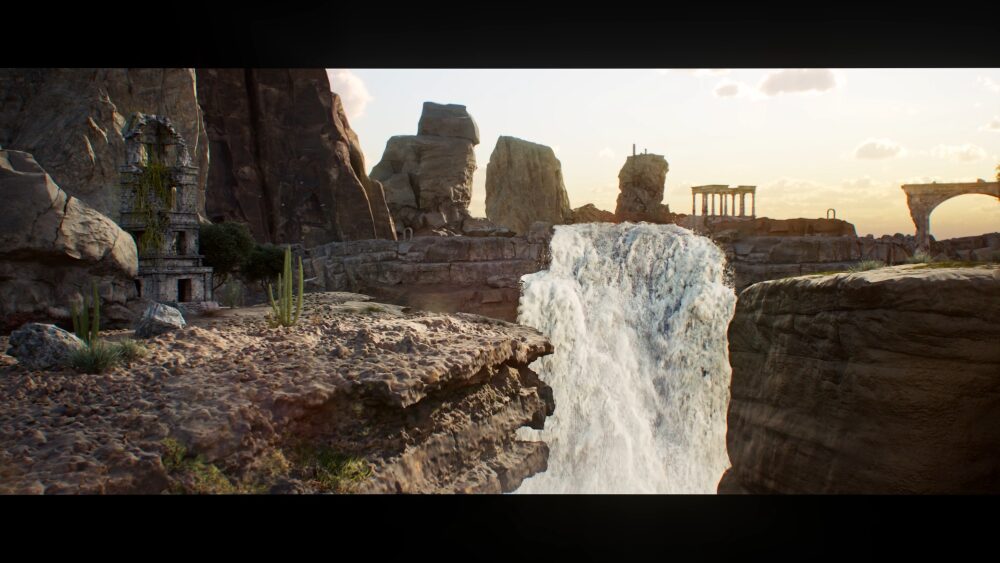Autodesk is making crowd tools more accessible, integrating AI to strengthen tools and enhancing Flow-connected workflows, in the latest release of its Design & Make software for Media & Entertainment.
“We’re breaking down long-standing technical barriers to get artists into the creative zone faster,” says Ben Fischler, Autodesk’s director of product management for content creation. “With new crowd simulation, AI-powered tools, and Flow-connected workflows, our latest updates help you reach that last 80% — where the real fun begins, and you can focus on making your shot work for the story.”
Autodesk has added the Golaem plug-in for Maya to the Media & Entertainment Collection, to simplify the process of creating large-scale crowd scenes — whether it’s a stadium full of cheering fans or soldiers on a battlefield — making it easier to fill 3D worlds with multiple animated characters.
More Accessible Crowd Tools with Golaem
“Crowd simulation has long been a challenge, and our mission has always been to make it accessible to all,” notes Nicolas Chaverou, Golaem co-founder and principal technical product manager at Autodesk. “Now, as part of Autodesk’s M&E Collection, we’re thrilled that Golaem is in the hands of more studios and can empower more artists to create stunning, large-scale scenes with ease.”
-
Golaem’s Layout tool allows studios to adjust and customize characters directly in the Maya viewport without altering simulations. Its built-in procedural animation engine helps control multiple characters at once. Once the simulation is set up in Maya, it can be transferred to 3ds Max, Houdini, Unreal or Katana using Golaem’s dedicated plug-ins.
-
Golaem for Maya supports major industry formats, including OpenUSD, streamlining the work across different tools.
-
Golaem joins a powerful lineup in the Media & Entertainment Collection, which includes Maya, 3ds Max, Arnold, MotionBuilder, Mudbox and 15 Bifrost simulation nodes in one cost-efficient package.
-
The Autodesk Media & Entertainment Collection allows running Arnold on up to five machines, making crowd rendering faster and more cost-efficient.
AI Tools for Interactive & Efficient Workflows
-
The Machine Learning Deformer in Maya, powered by Autodesk AI, addresses sluggish interactivity when working with complex characters.
-
The latest update to Maya brings major improvements to the ML Deformer for animators and layout artists, focusing on speed, quality, and ease of use. Load times are now 40 times faster, and disk space usage has been reduced by 80%, allowing creators to focus on building elements that tell extraordinary stories.
Flow Animating in Context
-
Flow Animating in Context integrates surrounding shots from Flow Production Tracking (formerly ShotGrid) directly into Maya’s timeline.
-
Animators and layout artists can scrub between their work and the surrounding shots, making informed creative choices to improve cut continuity.
-
Flow Animating in Context allows you to switch between different pipeline steps, whether its layout or FX, to further pinpoint the part of the cut you need to focus on. The result is faster production and better storytelling.

Enhanced Tools for Modeling, FX & OpenUSD
-
Modeling improvements – The powerful Volume Booleans tool is now available in Maya and 3ds Max, creating a more unified Boolean engine between the two tools. This update makes it easier to explore freeform shapes and build complex organic forms from simple primitives.
-
Liquids – Bifrost’s new liquid simulation feature is now available directly within the Bifrost graph. The new FLIP solver offers adaptive resolution for efficient computation, particle-based foam, and improved velocity estimation. You can also emit and blend colored liquids. It is perfect for large-scale, non-viscous fluids.
-
OpenUSD enhancements – Improvements continue across both Maya and 3ds Max OpenUSD, with added support for axis and scale adjustments in Maya and recently, an Attribute Editor in 3ds Max. A long-requested feature, Light Linking, is also now available in both tools, giving you greater control over rendering.
-
OpenPBR integration – OpenPBR is now the default shading option in both Maya and 3ds Max, bringing enhanced artistic controls, more accurate material representation across tools and improved interchange with other software.
For a complete list of new features, visit the Maya, 3ds Max, Arnold and Flow Production Tracking What’s New pages. Free trial of the Golaem plug-in for Maya is now available as part of the Media & Entertainment Collection.




 Win a Funko X Lilo & Stitch Prize Pack!
Win a Funko X Lilo & Stitch Prize Pack!

